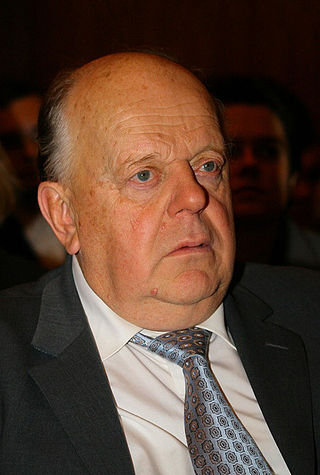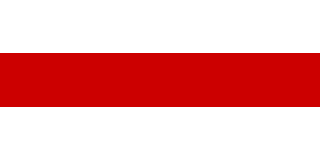
The politics of Belarus takes place in a framework of a presidential republic with a bicameral parliament. The President of Belarus is the head of state. Executive power is nominally exercised by the government, at its top sits a ceremonial prime minister, appointed directly by the President. Legislative power is de jure vested in the bicameral parliament, the National Assembly, however the president may enact decrees that are executed the same way as laws, for undisputed time.

Alexander Grigoryevich Lukashenko is a Belarusian politician who has been the president of Belarus since the office's establishment in 1994. This makes him the longest-serving European president.

Stanislav Stanislavovich Shushkevich was a Belarusian politician and scientist. From 25 August 1991 to 26 January 1994, he was the first head of state of independent Belarus after it seceded from the Soviet Union, serving as Chairman of the Supreme Soviet. He supported social democratic reforms and played a key role in the creation of the Commonwealth of Independent States.

The Belarusian Agrarian Party was an agrarian socialist political party in Belarus. It supported the government of Alexander Lukashenko. The leader of the party was Mikhail Rusy, who succeeded Mikhail Shimansky on 15 March 2008.

The Communist Party of Belarus is a communist and Marxist–Leninist political party in Belarus. The party was created in 1996 and supports the government of president Alexander Lukashenko. The leader of the party is Aliaksiej Sokal. The party has had more seats in the National Assembly of Belarus than any other party since the 2000 Belarusian parliamentary election, the first national election it participated in. However, most seats in the Belarusian legislature are held by independent politicians.

The Union State, or Union State of Russia and Belarus, is a supranational union consisting of Belarus and Russia, with the stated aim of deepening the relationship between the two states through integration in economic and defence policy. Originally, the Union State aimed to create a confederation; however, both countries currently retain their independence.

The BPF Party is a banned political party in Belarus. It was de facto established after the split of the social movement Belarusian Popular Front in 1999. The Belarusian Popular Front was founded during the Perestroika era by members of the Belarusian intelligentsia, including Vasil Bykaŭ. Its first and most charismatic leader was Zianon Pazniak.

Belarus elects on national level a head of state—the president—and a legislature. The president is elected for a five-year term by the people. The National Assembly has two chambers. The House of Representatives has 110 members elected in single-seat constituencies elected for a four-year term. The Council of the Republic has 64 members, 56 members indirectly elected and eight members appointed by the president.

The Liberal Democratic Party of Belarus is a political party in Belarus. It was created in 1994 as the Belarusian successor of the Liberal Democratic Party of the Soviet Union.

The State Security Committee of the Republic of Belarus is the national intelligence agency of Belarus. Along with its counterparts in Transnistria and South Ossetia, it kept the unreformed name after declaring independence.

The Constitution of the Republic of Belarus is the ultimate law of Belarus. The Constitution is composed of a preamble and nine sections divided into 146 articles.

The president of the Republic of Belarus is the head of state and head of government of Belarus. The office was created in 1994 with the passing of the Constitution of Belarus by the Supreme Council. This replaced the office of Chairman of the Supreme Council as the head of state. The tasks of the president include executing foreign and domestic policy, defending the rights and general welfare of citizens and residents, and upholding the Constitution. The president is mandated by the Constitution to serve as a leader in the social affairs of the country and to act as its main representative abroad. The duties, responsibilities and other transitional clauses dealing with the presidency are listed in Chapter Three, Articles 79 through 89, of the Constitution.

The All-Belarusian People's Assembly, or ABPA, is the highest organ of state power of the Republic of Belarus. Established in 1996, it was granted wide-reaching powers as a result of the 2022 Belarusian constitutional referendum and has since become the primary organ of the Belarusian government.

A four-question referendum was held in Belarus on 14 May 1995, alongside parliamentary elections. The four issues were the possibility of giving the Russian language equal status with Belarusian, whether new national symbols should be adopted, whether there should be economic integration with Russia and changes to the constitution that would allow early elections if Parliament systematically violated the constitution. According to official results, all four were approved by at least three-quarters of voters, with a turnout of 64.8%.

A seven-question referendum was held in Belarus on 24 November 1996. Four questions were put forward by President Alexander Lukashenko on changing the date of the country's independence day, amending the constitution, changing laws on the sale of land and the abolition of the death penalty. The Supreme Council put forward three questions on constitutional amendments by the Communist and Agrarian factions, local elections and the national finances.

Alexander Alhertavich Dabravolski is a Belarusian politician, lawyer, and radio physicist.

Viktor Vladimirovich Sheiman is a Belarusian politician.

The Belarusian opposition consists of groups and individuals in Belarus seeking to challenge, from 1988 to 1991, the authorities of Soviet Belarus, and since 1995, the leader of the country Alexander Lukashenko, whom supporters of the movement often consider to be a dictator. Supporters of the movement tend to call for a parliamentary democracy based on a Western model, with freedom of speech and political and religious pluralism.

A constitutional referendum was held in Belarus on 27 February 2022. The referendum was ordered by President Alexander Lukashenko in January 2022. According to political analysts, changes to the Belarusian constitution were intended to solidify the power of Lukashenko's regime after the mass protests in 2020 and 2021, which challenged his rule and was brutally suppressed by police. More than 35,000 people were arrested, 1,070 of whom are acknowledged political prisoners. The changes to Constitution allow Lukashenko to remain in office until 2035 and empower the All-Belarusian People's Assembly, an extra-parliamentary body dominated by government supporters. The changes also renounced Belarus's nuclear-free zone status, allowing Belarus to host nuclear weapons for the first time since the fall of the Soviet Union; the lead-up to the referendum occurred as Russia amassed its troops in both Russia and Belarus in the prelude to the Russian invasion of Ukraine, and the election itself was held several days after Russia began its military offensive into Ukraine.
Parliamentary elections were held in Belarus on 25 February 2024. The country elected 110 deputies to the lower house of parliament and about 12,000 representatives of local councils.














